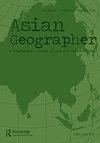全球城市发展与中国城市工资不平等
IF 2.2
Q2 GEOGRAPHY
引用次数: 4
摘要
摘要本研究着重检验了在中国全球化城市背景下,全球城市地位与城市不平等水平之间的假设关系。基于对中国城市全球连通性工资效应的多层次建模分析,本研究确定了中国城市专业职业、城市研究生和生产性服务业工人的“全球连通性薪酬溢价”,以及办事员和体力劳动者的“全球连接性工资歧视”,没有学士学位的城市个人和消费者服务工作者。研究结果证实了全球城市化程度与全球化中国工资不平等水平之间的正相关关系,并表明存在特定于中国案例的机制,这些机制破坏了高技能劳动力在全球导向部门的城市溢出效应。它呼应了最近对全球城市研究“省级化”的呼吁,并强调了与中国在世界城市网络中不断上升的角色相关的不平等的另一个来源。本文章由计算机程序翻译,如有差异,请以英文原文为准。
Global city development and urban wage inequality in China
ABSTRACT This study stress-tests the hypothesized relationship between global city status and the level of urban inequality in the context of China’s globalizing cities. Based on a multi-level modelling analysis of the wage effect of Chinese cities’ global connectivity, this study identifies a “global connectivity wage premium” for professional occupations, urban individuals with post-graduate degrees, and producer service workers in Chinese cities, as well as a “global connectivity wage discrimination” for clerks and manual workers, urban individuals with no bachelor degree, and consumer service workers. The results confirm the positive association between the degree of global cityness and the level of wage inequality in globalizing China and suggest the presence of mechanisms specific to the Chinese case that undermine the city-wide spillover effects of high-skilled labor forces in globally oriented sectors. It echoes the recent call for “provincializing” global city studies and highlights an additional source of inequality in relation to China’s unrelenting trajectory toward a rising role in the world city network.
求助全文
通过发布文献求助,成功后即可免费获取论文全文。
去求助
来源期刊

Asian Geographer
GEOGRAPHY-
CiteScore
3.30
自引率
0.00%
发文量
7
期刊介绍:
Asian Geographer disseminates knowledge about geographical problems and issues focusing on Asia and the Pacific Rim. Papers dealing with other regions should have a linkage to Asia and the Pacific Rim. Original and timely articles dealing with any field of physical or human geographical inquiries and methodologies will be considered for publication. We welcome, for example, submissions on people-environment interactions, urban and regional development, transport and large infrastructure, migration, natural disasters and their management, environment and energy issues. While the focus of the journal is placed on original research articles, review papers as well as viewpoints and research notes under the category of “Asian Geography in Brief” are also considered. Review papers should critically and constructively analyse the current state of understanding on geographical and planning topics in Asia. The ‘Asian Geography in Brief’ section welcomes submissions of applied geographical and planning research about Asia. The section aims to showcase (1) the diverse geography and planning of Asia; and (2) the diverse geographical and planning research about Asia. The journal will also publish special issues on particular themes or areas. Book reviews can be included from time to time.
 求助内容:
求助内容: 应助结果提醒方式:
应助结果提醒方式:


